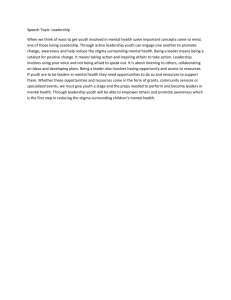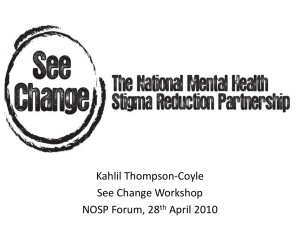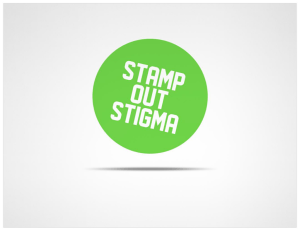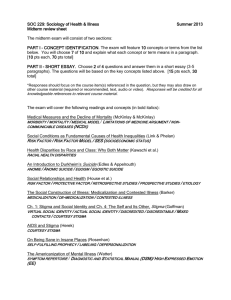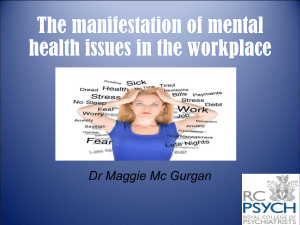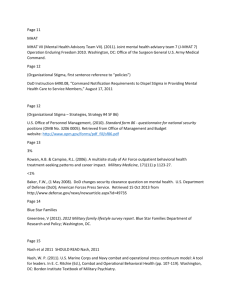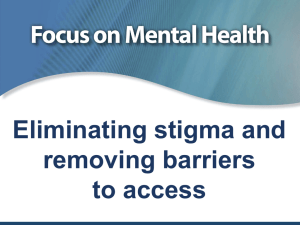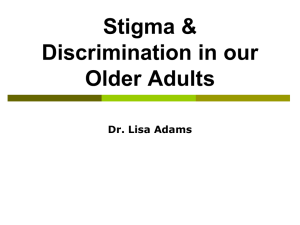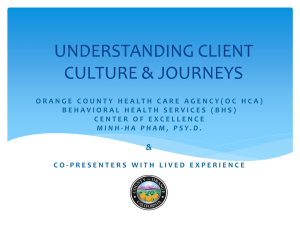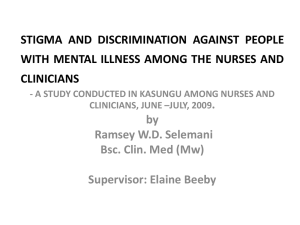Mental Health Board, NAMI OC Family-to-Family Trainer
advertisement
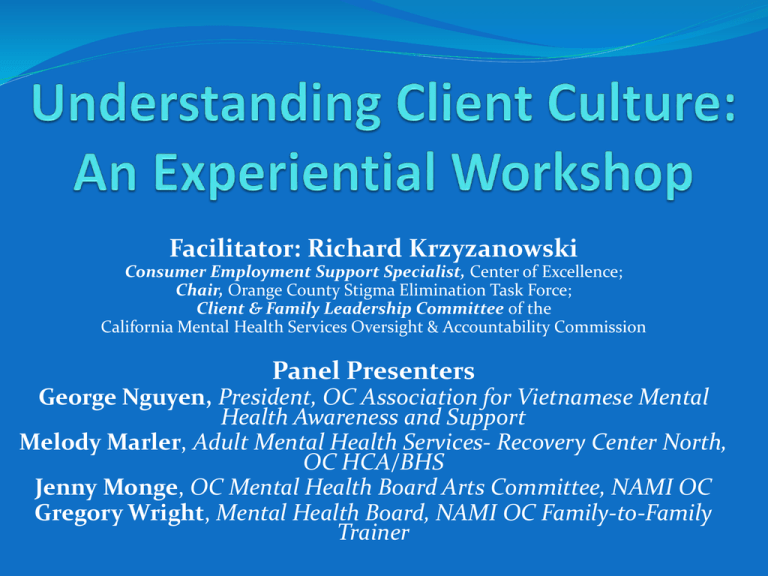
Facilitator: Richard Krzyzanowski Consumer Employment Support Specialist, Center of Excellence; Chair, Orange County Stigma Elimination Task Force; Client & Family Leadership Committee of the California Mental Health Services Oversight & Accountability Commission Panel Presenters George Nguyen, President, OC Association for Vietnamese Mental Health Awareness and Support Melody Marler, Adult Mental Health Services- Recovery Center North, OC HCA/BHS Jenny Monge, OC Mental Health Board Arts Committee, NAMI OC Gregory Wright, Mental Health Board, NAMI OC Family-to-Family Trainer Definition of Culture “Culture” refers to the shared attributes of a group of people. People can share a culture, regardless of their “race” (= socio-biological category associated with visible physical characteristics such as hair, skin tone) or ethnicity (= heritage of a particular group) Definition of Culture “Culture” is broadly defined as a common heritage or learned set of beliefs, norms, and values (U. S. Department of Health and Human Services, 2001) Example: people who work for a particular organization or participate in a social group may share the same cultural attributes. Facts About Mental Health Mental health issues affect almost every family in America. People with mental health issues can and often do recover with the support of their peers, family, friends and communities, and by working with mental health professionals for proper diagnosis, treatment and medication. Facts About Mental Health Recovery can be achieved via tapping into inner strength, resilience, spirituality, self-help strategies (self-responsibility and selfdetermination), family/peer/community supports, and a sense of connection with other people and society. People with mental health issues can and do make important contributions to our family and community systems, as well as to the mental health professions. Hope Empowerment Self-determination Freedom of Choice Knowledge of Rights Self-Confidence Self-Advocacy Responsibility Developing Peer & Other Support Systems Stigma: Some definitions “A mark of disgrace or infamy; a stain or reproach, as on one's reputation.” “An attribute, behavior, or reputation which is socially discrediting in a particular way: it causes an individual to be mentally classified by others in an undesirable, rejected stereotype rather than in an accepted, ‘normal’ one.” Confounding facts and fallacies A social set of attitudes with institutional implications Not always negatively phrased or ill-intentioned Paternalism Self-stigma Self-stigma is defined as negative attitudes about mental illness and its treatment that are held by the individual with the stigmatized condition. Self-stigma has recently been cited as a major public health concern, contributing to decreased treatment seeking, lowered self-esteem, and lowered self-efficacy. Self-stigma is the prejudice which people with mental health issues turn against themselves. Stigma and Its Negative Impacts Stigma is one of the most prevalent and persistent obstacles hindering the transformation of any mental health system and of attitudes in the community. Many clients still underutilize mental health services and remain un-served in part because of the stigma against people with mental health issues. Stigma and its negatives Fear of discrimination is the key barrier that keeps many people from revealing symptoms and seeking help, services and treatment. Stigma leads to low self-esteem, a sense of being misunderstood, hopelessness, shame and guilt. Stigma also deters people from socializing or working with, renting to, or employing mental health clients. Stigma: Two recent studies Corrigan, P.W. (2005). On the stigma of mental illness: Practical strategies for research and social change. Washington, D.C.: APA. Pescosolido, B.A., Jensen, P.S., Martin, J.K., Perry, B.L., Olafsdottir, S., & Fettes, D. (2008). Public knowledge and assessment of child mental health problems: Findings from the National Stigma Study—Children. Journal of the American Academy of Child & Adolescent Psychiatry, 47, 339–349. Confronting Stigma "If you focus on the competence of people with mental illness, that tends to lead to greater tolerance.” --- Pescosolido Contact with people who have mental health issues tends to decrease stigma Meeting people who have mental health issues weakens people's tendency to link mental illness and violence. Client Culture: A Definition Client culture shares some common attributes in that the life conditions or disability of a client, the attitudes and practices of the health care system, and ethnic/cultural contexts in many ways affect and mold the values, beliefs and lifestyles of the client as well as his/her family system. Sharing Cultures As lives are shared, each gains a new value … Culturally Competent Practice From a culturally competent practice and perspective, (Cross et al.,1989), systems, agencies and professional providers of services to clients/consumers would utilize a set of congruent values, practice skills, attitudes and policies in working effectively together in cross-cultural situations. Culturally Competent Health Care Providers Provider’s awareness of his/her own cultural values and biases is the pre-requisite for being able to accept and embrace similarities and differences of client’s worldviews in order to become effective. Accurate understanding of the life change events and illness of clients, their cultural and family systems would lead to a comprehensive understanding of client’s development, emotional, functional and cognitive process and behaviors. Effective Mental Health Care Delivery With a best-practice s approach, Mental Health Care Providers: Respect persons with mental health issues Understand and attend to clients’ real needs Incorporate wellness into care and work to create and maintain a continuous, healing relationship Effective Mental Health Care Delivery Show respect in the form of active listening, take complaints seriously, evaluate and re-evaluate if necessary, attend to thorough follow-ups, being patient and kind with effective communication Coordinate with other professional providers to deliver and link necessary care from housing to community-based supports in a timely manner Are congruent and self-reflective with the ability to acknowledge one’s own limitations Advocate on behalf of clients Toward a Transformed Mental Health System Build a path toward increasing respect for human dignity and thoughtful understanding of our clients, their families, and cultural & contextual systems with more humanity, compassion and acceptance Gain a deeper awareness of family systems, cultural context as well as quality care delivery within our health care systems
